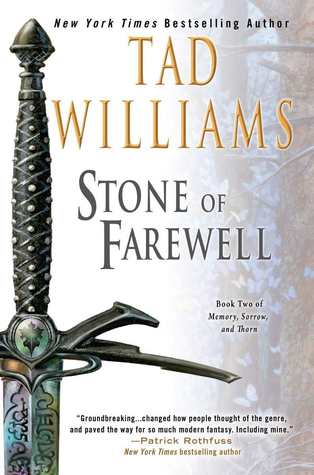More on this book
Community
Kindle Notes & Highlights
by
Tad Williams
Read between
October 16 - December 13, 2021
The valley was flooded. The Stone of Farewell, a great fist that seemed to defy the rain-lashed skies, had become an island in a gray and restless sea. Binabik and Sludig were perched at the forest’s edge only a half-league away from their goal, but every cubit of valley floor that lay between was covered by fathoms of floodwater.
the Hernystiri remembered.
If Sinetris must be torn from his home and the bosom of his family and sacrificed to the whims of a monster in the robes of a priest, if he must die . . . let it be as a guild-man!” Isgrimnur groaned. “Let it be with his mouth closed, for a change. And keep paddling.” “Rowing,” Sinetris replied frostily, then burst into tears once more. • •
“Spend it doing your very best to make sure that I do not see you again. Because if I do,” he lifted his hairy fist, “I will roll your eyeballs around in your pointy head. Understood?”
When the woman turned, her sour expression had been supplanted by a look of greedy pleasure. “You?” she said. “You’re the one with the gold?” She opened her arms wide as though to embrace him. Despite the dozen cubits that separated them, the duke took a step backward, repelled. The bundle of blankets in the corner began to wiggle like a nest of piglets, then fell away. A small and very thin Wrannaman sat up, eyes still half-closed from sleep.
The duke felt the world tilt, as though giant hands had lifted it. It took long moments before he could speak, moments in which the landlady, the little Wrannaman, and the old doorkeeper looked at him with varying degrees of uneasy fascination. When Isgrimnur spoke, it was to the old man.
“My lord Camaris,” he said, and felt his voice catch in his throat. The world had gone mad: now the dead lived again. “Merciful Elysia, Camaris, do you not remember me? I am Isgrimnur! We fought for Prester John together—we were friends! Ah, God, you live! How can that be?” He
Simon frowned. He had learned that Sithi, unlike mortals, would actually go away if permission was not given. Jiriki’s folk had a deep respect for privacy. “I suppose so,” Simon said at last.
“In fact,” Amerasu continued, “strange as this may sound, it is possible that some of the things I must say are better suited to the languages of the Sudhoda’ya. The mortals have always lived beneath one kind of darkness or another. That is among the reasons we named them ‘sunset-children’ when they first came to Osten Ard.” She paused.
“The manchildren, the mortals, have many ideas of what happens after they die,
and wrangle about who is right and who is wrong. These disagreements often come to bloodshed, as if they wished to dispatch messengers who could discover the answer to their dispute. Such messengers, as far as I know of mortal philosophy, never...
This highlight has been truncated due to consecutive passage length restrictions.
“He has become something the world has not seen before, a smoldering ember of despair and hatred, surviving only to redress those things which long ago were injustices and mistakes and tragic underestimations, but now are simply facts. Like
Stormspike.
Utuk’ku, who hides her agedness behind a silver mask, unwilling to admit that the shadow of death can touch her, too. She fears Unbeing more than any other of our race, though she is the eldest who still lives—the last of the Gardenborn.” Amerasu laughed quietly. “Yes, my great-grandmother is very vain.” For


